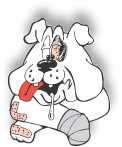|
|
|
Diphenhydramine (Benadryl®)
BRAND NAME: BENADRYL
Available in 25 mg & 50 mg capsules (oral suspension is too high in alcohol content to be used for animals)
BACKGROUND
Histamine is an inflammatory biochemical that causes skin redness, swelling, pain, increased heart rate, and blood pressure drop when it binds to one of many H1 receptors throughout the body. Histamine is an important mediator of allergy in humans, hence a spectacular array of different antihistamines has proliferated. Histamine, perhaps unfortunately, is not as important a mediator of inflammation in pets, which means results of antihistamine therapy are not as reliable in pets.
HOW THIS MEDICATION IS USED
Diphenhydramine has several important effects and thus several uses. Most obviously, diphenhydramine is an antihistamine and it is used for acute inflammatory and allergic conditions such as:
Diphenhydramine is frequently included in antihistamine trials for allergic skin disease. It is not one of the more effective antihistamines in this regard but its availability and inexpensiveness make it worth trying in many cases.
Mast cell tumors are tumors involving cells that contain granules of histamine. Patients with mast cell tumors experience chronic inflammatory symptoms due to circulating histamine. Antihistamines such as diphenhydramine may be helpful given long term.
Diphenhydramine has a strong anti-nausea side effect which makes it helpful in treating motion sickness.
Diphenhydramine causes drowsiness in animals just as it does in people and can be used as a mild tranquilizer.
SIDE EFFECTS
With so many possible uses of this medication, it is difficult to separate out a side effect from a primary effect. Drowsiness is generally regarded as an undesirable side effect.
At doses higher than the recommended dose, human patients complain of dry mouth and experience difficulty with urination.
INTERACTIONS WITH OTHER MEDICATIONS
In the treatment of allergic skin disease, antihistamines are felt to synergize with omega 3 fatty acid supplements and, as a general rule for this condition, it is best to use these medications together.
Diphenhydramine should not be used with additional tranquilizing medications.
In animals that experience a hyperactivity reaction while taking metoclopramide (Reglan), this effect can be reversed with a dose of Diphenhydramine.
CONCERNS AND CAUTIONS
It is important to realize that the name Benadryl is a brand name. It is easy to try to save money and try to buy over-the-counter diphenhydramine and end up with an inappropriate product. To emphasize this point, we show such a product below. It seems like it would contain diphenhydramine but, in fact, it contains a combination of diphenhydramine and other medications, including a dose of acetaminophen that could be lethal to a pet.
Never buy over-the-counter medication for your pet without knowing exactly what you are
supposed to get and never medicate your pet without your vet’s guidance.
Veterinary Partner
Web Site
|
|

|
One way to treat
bee stings is to give the dog Benadryl (diphenhydramine) by mouth.
Typical dosages: for cats and dogs under 30 pounds, give 10
mg ... dogs 30 to 50 pounds, give 25 mg ... dogs over 50 pounds, give 50 mg. Use only the plain Benadryl formula.
"Any medications need to be discussed with and prescribed by a
Veterinarian prior to giving them to your pet to avoid an inadvertent
and tragic poisoning."
Benadryl is a very useful emergency drug -- both for humans and for pets. If possible, speak to your vet about possible emergency insect bite/bug sting scenarios with your vet before they happen -- in case your vet cannot be immediately reached. Minutes count!
Benadryl, while a fairly safe drug, DOES have potential adverse effects and is not for every pet. Benadryl is to be
used with extreme caution in patients with glaucoma, prostatic disease, cardiovascular disease, and hyperthyroid, among other conditions. It may also interact with drugs that your pet is taking, so be sure to discuss use of ANY drugs for your pet with your vet first.
(Sidenote: some human over-the-counter drugs are toxic or fatal to
pets; always discuss with your vet before "self-medicating" for any condition.
Unlike true antihistamines, which prevent the release of
histamine, diphenhydramine works by blocking the effect of histamine at H1 receptor sites. This results in effects such as the reduction of smooth muscle contraction, making diphenhydramine a popular choice for treatment of the symptoms of allergic rhinitis, hives, motion sickness, and insect bites and stings.
There
is also Benadryl Cream ~ great cream for bug bites and other minor scrapes or
injuries! |
|
What Not To Use
THE FOLLOWING ARE POISONOUS TO YOUR PET!:
NEVER EVER give
Tylenol (toxic to liver) or ibuprofen (Nuprin, Motrin, Advil, etc.). Ibuprofen is very toxic and fatal to dogs at low doses. Only aspirin is safe for dogs, and buffered aspirin or ascriptin is preferred to minimize stomach upset.
Ointments containing zinc can cause stomach irritation in pets
Mosquito and lice sprays formulated for humans are toxic if applied to pets (because they are likely to lick themselves and ingest the DEET or permethrin). |

|
| LINKS |
|
|
|
|
|
|

|
For Diet & Nutrition Links,
CLICK HERE
For Alternative Health, CLICK
HERE

Check
out our CANINE FIRST AID page!
|
|